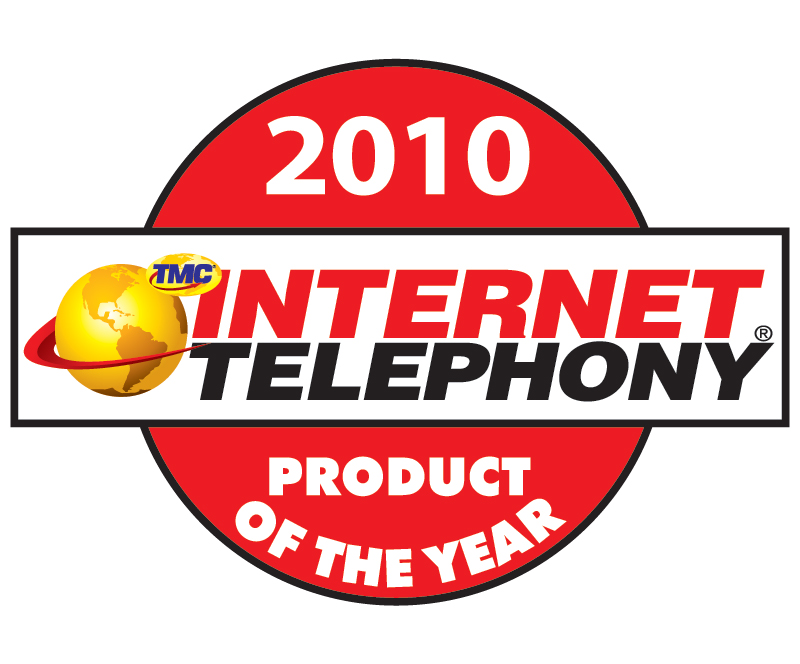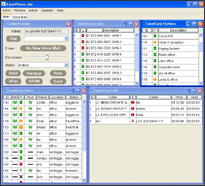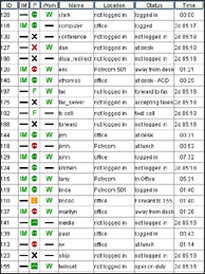QUICK QUOTE

FacetPhone IP PBX Business Phone System
Interested in learning more about the FacetPhone IP telephone system? If so, sign up for a free web demonstration!
The FacetPhone IP-PBX business telephone system is a state-of-the-art communications system that is "VoIP from the ground up!" FacetPhone is now available for Mac and Linux computing environments. See the new FacetPhone Mac brochure here. The FacetPhone user interface can be used on any computer that supports Java.
FacetPhone is ideal for businesses large to small, and provides "enterprise-class" features such as visual voice mail, call recording, multiple auto-attendants, ACD queues with full call center and contact center support, conference bridging, enterprise instant messaging, multiple office and telecommuter integration, unified communications, powerful IVR functionality, and a rich computer-based graphical user interface for any and all users within the company. And with FacetPhone, you don't have to pick and choose the features you want. It comes as a single package providing you all the features you need now, and in the future, all at a single affordable price.
FacetPhone includes all the normal features of a PBX plus much more as you can see below. With FacetPhone there are no feature packages to choose from. You always get all the features for one low price.
- Telephone User Interface
- Graphical User Interface
- Presence and Availability Management
- Voice Mail and Unified Communications
- Auto-attendant
- Call Center Features
- CallerID Support
- Computer Telephony Integration (CTI)
- Enterprise Instant Messaging
- Branch Office and Telecommuter Support
- Graphical Administration
For voice communications, FacetPhone uses IP phones, standard analog telephones and soft phones in any combination. From the telephone instrument, users may dial, answer, put calls on hold, transfer calls, park calls, pickup parked calls, conference, record calls and manage their voice mail. IP phones and standard analog phones with callerID displays and voice mail waiting indicators are supported.
The FacetPhone user interface provides a powerful and easy to use desktop computer interface to the phone system for all system users. Presence management, graphical call control, enterprise instant messaging, visual voice mail with advanced voice mail delivery, unified communications, call recording, conference calls & conference bridging, contact center controls, and user-level and system-level administration are all provided through this interface. The FacetPhone user interface is available for Windows, Mac OS X, and Linux desktops and laptops.
Using the graphical user interface on the PC, FacetPhone provides an informative display detailing which employees are available, on the phone, busy, at lunch, out of town, etc. This display is available not only to operators but to all users if desired. Operators and users may see the availability status of people within a department, the entire company, or any other group the administrator allows. Operators (and optionally users) may visually monitor phone lines and extensions. With Call Forwarding users may set their status to have their calls forwarded to an outside number. And with Roaming Extensions, also known as "hot desking" or "hotelling", users may login to FacetPhone from any extension or location, including a branch office or home office. FacetPhone automatically routes calls for a user to the proper telephone, and the presence display reflects the user's current physical location.
Voice Mail & Unified Communications
FacetPhone supports all the standard voice mail features through the telephone. But through the graphical user interface, voice mail becomes particularly useful and easy to manage. When the user receives a voice mail message, the FacetPhone user interface gives an immediate indicator on the user's PC screen.
- Security: FacetPhone voice mail security is provided through a user Personal Identification Number (PIN).
- Voice Mail Light on Phone: FacetPhone automatically manages the voice mail waiting indicator light on telephones that have this feature.
- Multiple Greetings: The user may define multiple voice mail greetings for different situations depending on their user status.
- Graphical User Interface to Voice Mail: The user interface allows users to visually sort and manage their voice mail messages. Each voice mail message has the callerID information, date and time of the message, text notations associated with the message, and the message duration.
- Add Text / Comments: Users may add text comments to any voice mail message as a short visual description of the message content.
- Playback: Voice mail messages may be played on the telephone or the PC speakers.
- Voice Mail Distribution Lists: Much like email distribution lists, voice mail lists can be created for the entire company or by individuals for their own use. Once the distribution list is created, users can send group messages by going into their voice mail management and simply recording and sending the message. When a user receives a voice mail message sent to a group, they can send a reply voice mail either to the sender or to the entire group of recipients. Likewise, they can forward the voice mail (with an optional prefix message) on to a specific user or group of users.
- Voice Mail Forwarding To Email: Users may choose to have their voice mail forwarded to their email account as an audio attachment. Voice mail may be forwarded to email on an ad-hoc or continuous basis, giving the user an easy-to-manage unified messaging system.
- Voice Mail Notification via Email: Users may opt to have a special notification only email (without the actual audio attachment) sent to them whenever a new voice mail is received. This will give them an instant alert via email, cell phone or pager with the callerID information.
- Voice Mail Proactive Delivery: Users may have FacetPhone automatically call them at one or more outside telephones to deliver new voice mail.
- Mouse Click Return Call: Users may place a return call to the sender of the message with a single mouse click.
- Informational Only Mailbox: Mailboxes may be defined to provide informational messages without recording any voice mail. This can be useful as an end point for the auto attendant routing to a group mailbox.
- Telephone Access: The FacetPhone voice mail system is completely available to users from a standard telephone. Users may access this system locally or remotely. When dialing out from their extension, a stutter dial tone indicates new voice mail messages have been received.
Utilizing FacetPhone's powerful and flexible Interactive Voice Response (IVR) system, the auto attendant feature is available for use by both the main reception lines and departmental groups. Auto attendant is also supported at the user/extension level through the voice mail system. All greeting prompts are completely customizable by the company and group. Some of the auto attendant features are:
- Reception: FacetPhone is designed to be used with or without a receptionist answering the inbound phone calls. The auto attendant for the main reception lines can be turned on or off as needed. It can be on during normal business hours and provide automated routing of all calls. Or, it can be activated only for after hours and holidays. It can also be used as a backup to the receptionist where it is activated only after a predetermined number of rings.
- Group: At the group or department level, the FacetPhone auto attendant can be on all of the time, or activated for non-business hours, departmental meetings, lunch hours, etc.
- Dial by Name: The FacetPhone auto attendant allows in-bound callers to route their call to the appropriate person without knowing their extension. This feature allows for either first or last name directory look up.
- Dial by Extension: In-bound callers may quickly route their call to the appropriate person if they know the correct extension number.
- Dial by Group: FacetPhone will allow in-bound callers to route their call directly to the auto attendant of a group or department.
- Voice Mail: Of course, callers may be routed directly to a user's voice mail, or voice mail management.
- Informational: The FacetPhone auto attendant can also be used to play specific informational messages (without allowing for a voice mail to be recorded) based on telephone menu prompts.
- Automatic Call Distribution (ACD): The FacetPhone ACD provides for automatic call routing to the next available agent in a group or department. The FacetPhone GUI has a separate window for monitoring and managing the ACD queues. This shows the number of agents on duty and available, the number of unanswered calls in the queue, and the average and maximum wait times. The current status of these statistics is shown, along with a rolling average over several time periods.
- Call Monitoring / Recording / Barge-In: With FacetPhone, call center supervisors and managers may monitor calls, and may optionally record calls, or barge in to calls "on-the-fly" as needed. When monitoring calls, other supervisors and managers can see at a glance on the FacetPhone graphical user interface which calls are already being monitored. With call recording, management may record all calls on a per user basis, or they may start and stop recording during specific calls. With call "barge-in," supervisors may easily join a call in progress to lend advice or clarification.
- Alarm Limits: The call center manager or supervisor can set alarm limits so they will be instantly notified when the number of calls in the ACD queue exceeds a specified limit, or when the average wait time is greater than the defined limit.
FacetPhone provides complete support for callerID. The company name (if available) and phone number of the calling party is provided to the user in multiple ways, depending upon individual preferences.
- Telephone Instrument: If the telephone instrument supports callerID, the information will be displayed on the telephone.
- FacetPhone User Interface: For calls from the outside, the operator or user gets a small FacetPhone screen pop on their PC with the caller's company name and phone number. For calls from another inside extension, the user will get a similar screen pop on their PC with the caller's name and extension.
- Voice Mail: Any voice mail messages received will retain the associated callerID information.
- TAPI Applications: Users may optionally configure FacetPhone to provide screen pops through their Windows applications such as Outlook, Goldmine and any TAPI enabled application such as Act!. With these applications, FacetPhone provides the callerID information and they automatically pull up a matching record in their database if one exists.
- UTAPI & NetTAPI Applications: Virtually any software application may take advantage of the FacetPhone UTAPI and NetTAPI protocols to request the callerID. In real time, FacetPhone will send any callerID data to the application which can then screen pop the corresponding database record. To take advantage of UTAPI and NetTAPI, changes need to be made to the customer's software application.
* The callerID service must be purchased separately from the customer's local phone service suppler.
Computer Telephone Integration (CTI)
Computer Telephone Integration is the ability of the phone system to interact with the company or employee computer system(s). An IP-based phone system is particularly well suited for CTI. FacetPhone uses CTI to communicate with customers' software applications.
- CTI - TAPI (Windows Applications): FacetPhone supports Computer Telephone Integration (CTI) with some Windows applications through Microsoft’s Telephone Application Programming Interface (TAPI). TAPI provides a standard way for Windows applications to interact with a telephone system. Users can dial from their TAPI enabled application (such as Act!) and also perform “screen pops” which automatically brings up customer information based on the callerID data provided by the phone system (see screen shot under callerID Support). In addition, FacetPhone supports the proprietary telephone interfaces provided by the popular Outlook and Goldmine applications.
- CTI UTAPI (Universal TAPI): FacetPhone supports Computer Telephone Integration with software applications through an easy-to-use protocol developed by FacetCorp. UTAPI allows companies to quickly and easily enhance their customer relationship management application to allow telephone dialing and callerID-based customer lookups.
- CTI NetTAPI (Network TAPI): For more comprehensive interaction with software applications, FacetCorp developed the NetTAPI protocol. The NetTAPI commands allow for application program notification of any user phone activity, to initiate and terminate call recording, and to request the complete call detail record associated with a user's phone call. With FacetPhone's NetTAPI, customers and software providers can automatically put the entire call detail record, including the location of any recordings, in the corporate customer relationship management system.
Enterprise Instant Messaging (EIM)
Instant messaging, or text chat, can be conducted between two or more users logged into FacetPhone. This feature is particularly handy for those quick co-worker communications where someone doesn't want to intrude with a phone call or wait for an email response. It is also very useful for short, quick communications while you are on the phone. FacetPhone EIM excludes all parties that are not on the corporate network resulting in a more secure, productive work environment.
FacetPhone fully integrates users that are in a branch office or are telecommuters via the Internet. Remote locations become simple telephone extensions, so users may dial inside extensions or outside numbers just as they would from their central corporate location. They get complete access to the FacetPhone graphical user interface and telephone functions. Operators and other users on FacetPhone can see their remote status through the presence management screen. Branch office and telecommuter support require the following components:
- Broadband Internet connections at remote and HQ locations
- VPN Router at remote and HQ locations
- FacetPhone gateway at remote locations
FacetPhone is designed to be completely managed and administered by the customer. Through the FacetPhone user interface, the user may control their: user location/work status, voice mail greeting settings, and unified messaging directives. The manager may control: users, groups, lines, stations, and gateways
Screenshots


FacetCorp Products : IP PBX|Terminal Emulator|Serial Only Terminal Emulator|Multiple Session Manager
FacetCorp Support : Documentation|License Registration|Software Downloads|Technical Application Notes
FacetCorp Partners : Authorized Distributors|Authorized Resellers|FacetPhone Resellers|FacetTerm Resellers|FacetWin Resellers
